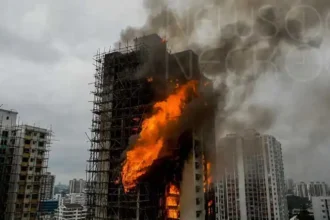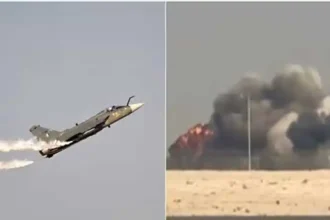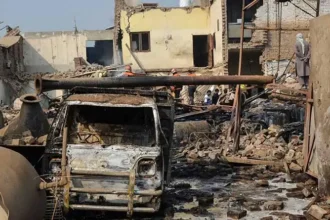A Grief Interrupted: The Day a Sudanese Funeral Became a Target
It was a gathering for mourning, a moment of shared sorrow in the small village of al-Luweib. Under the shade of a tent, friends and family had come together to remember a life lost. But in a conflict where nowhere seems safe, even a funeral is not a sanctuary.
In a sudden, violent moment, that tent of mourning was torn apart. A drone strike slammed into the gathering on Monday, killing at least 40 people and injuring dozens more. The attack has sent a new wave of horror through a country already drowning in despair.
Officials and local aid groups are pointing fingers at the paramilitary Rapid Support Forces (RSF). They say it was an RSF drone that carried out the deadly strike. The RSF has not yet commented on the allegation.
The village sits just outside el-Obeid, a strategic city held by the Sudanese army. This city is a vital lifeline, connecting the capital, Khartoum, to the western region of Darfur. For many of the wounded, the journey to the hospital in el-Obeid was a race against time—a race that, for too many, was lost.
A Deepening Crisis in a Strategic Region
This attack did not happen in isolation. It is part of a fierce and growing fight for control of the oil-rich Kordofan area. Just last week, the RSF captured the nearby town of Bara. This victory caused around 20,000 people to flee their homes, seeking safety in el-Obeid.
The fall of Bara happened at the same time as the RSF took over el-Fasher. That city had been the army’s last major stronghold in the Darfur region. Since its capture, terrifying reports have emerged from el-Fasher.
There are accounts of mass killings, sexual violence, and widespread looting carried out by RSF fighters. The United Nations has also received reports of summary executions of civilians in Bara. The International Criminal Court (ICC) has warned that these acts could be war crimes and crimes against humanity.
While the RSF leader has promised to investigate “violations,” his group denies that the killings are part of a larger, ethnically motivated campaign.
Also Read: Sudan Crisis: Germany, Jordan & UK Urge Urgent Ceasefire
‘The World’s Largest Humanitarian Crisis’
As the violence spreads, the suffering of the Sudanese people deepens in ways that are hard to comprehend. On the same day as the funeral strike, a global group of food security experts confirmed a grim reality. The people of el-Fasher are now experiencing famine, after an 18-month siege by the RSF.
Another city, Kadugli, is also in the most catastrophic stage of hunger, surrounded and cut off from supplies.
The United Nations chief, António Guterres, has issued a desperate plea. “The devastating crisis in Sudan is spinning beyond control,” he said, calling for an immediate end to the violence and urging both the army and the RSF to come to the table and “put a stop to this nightmare.”
There is a glimmer of hope—a Sudanese government source says the authorities are considering a US proposal for a truce. But past peace talks have failed, and both sides have shown little willingness to stop fighting.
Since this civil war began in April 2023, the numbers are staggering. More than 150,000 people have died. About 12 million have been forced to flee their homes. The UN calls it the world’s largest humanitarian crisis. And in a village called al-Luweib, that crisis now has fresh, heartbreaking names and faces—of those who were simply trying to say goodbye.
Author: Junaid Arif
Date: 04 Nov, 2025
For More Updates, Visit Newsneck













